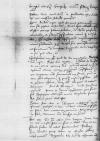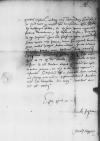Letter #1823
Cornelis DE SCHEPPER to Ioannes DANTISCUSBrussels, 1537-12-21
English register:
As far as his duties allow him, De Schepper is replacing with this letter his previous one [IDL 6918], undelivered due to the death of [the Fuggers’ factor] Pompeius Occo.
De Schepper informs Dantiscus that he has just been called to take part in the Emperor’s [Charles' V] peace negotiations with the King of France [Francis I] in Perpignan and Narbonne. He is to travel there using relay horses. Following him is the Duke of Aarschot, and a lawyer from the Council [of the habsbur Netherlands]. The meeting is due to begin on 17 December. De Schepper expects positive results from the negotiations.
De Schepper reports on the rebellion of several towns against the Duke of Guelders [Charles II of Guelders]. A truce has been concluded but a few fortresses and castles are to be demolished and duties and contributions lessened. In De Schepper’s view, Guelders is moving towards democracy under the influence of Luther’s doctrine.
De Schepper thinks Dantiscus fully deserves the office of coadjutor of Ermland which he received from the King [Sigismund I]. He himself is satisfied with his lot.
De Schepper informs Dantiscus of how his former acquaintances and friends from the court are doing: Petrus [Mirabilis de Monteregale], Dantiscus’ former servant, has been generously provided with benefices according to his needs by [Nicolas Perrenot de] Granvelle [i.e. in the County of Burgundy]. The Archbishop of Lund [Johan Weze] has won great respect in Hungary and Germany. He has received a major abbey from Prince Palatine Friedrich as well as a considerable income from the Emperor. Besides bishoprics he also has numerous lesser benefices. Godschalk [Ericksen] is well. Melchior [Colditz?] has died, leaving a surprisingly large estate; so has [Ulrich] Ehinger.
De Schepper promises that when he returns from his journey in three months or so, he will write to Dantiscus about his family affairs.
The only noteworthy news is the King of England’s [Henry's VIII] preparations for his fourth marriage.
De Schepper offers Dantiscus his help if he has any matters in need of being handled in the Low Countries. He can also trust Wolfgang Haller, who has become significantly richer through marriage, and Lazarus Tucher.
He reports that his sister-in-law Joanna [Donche] has married.
De Schepper, his wife [Elisabeth Donche] and her sister [Joanna Donche], and also Miklos Oláh commend themselves to Dantiscus.
| received [1538]-02-22 Manuscript sources:
Auxiliary sources:
Prints:
| ||||||||||||||||||
Text & apparatus & commentary Plain text Text & commentary Text & apparatus
Reverendissimo in Christo Patri et Domino, domino
Reverendissime in Christo Pater et Domine, domine honorandissime et observandissime.
Salutem.
Nescio, quo fato cf.
Imprimis mihi novum iter paratur ad
In
Augmentum, quod benignitate  AAWO, AB, D.6, f. 25v
honestis arduisque honestum written over s⌈smm written over s⌉ animum fidemque interponens.
AAWO, AB, D.6, f. 25v
honestis arduisque honestum written over s⌈smm written over s⌉ animum fidemque interponens.
Eodem fato obiit et
Apud nos hic omnia adhuc sunt integra. Intra duos aut tres menses spero me fore in reditu. Tunc ad te subinde scribam de rebus familiaribus. Publicae sunt admodum paucae, nam ex  AAWO, AB, D.6, f. 26r
quartas nuptias ambitque non contemnendam sortem etc.
AAWO, AB, D.6, f. 26r
quartas nuptias ambitque non contemnendam sortem etc.
Si quid voles per amicos hic transactum esse, scribe. Est
Soror
Rursum vale.
Ex
Eiusdem Reverendissimae Dominationis Vestrae humilis inservitor



